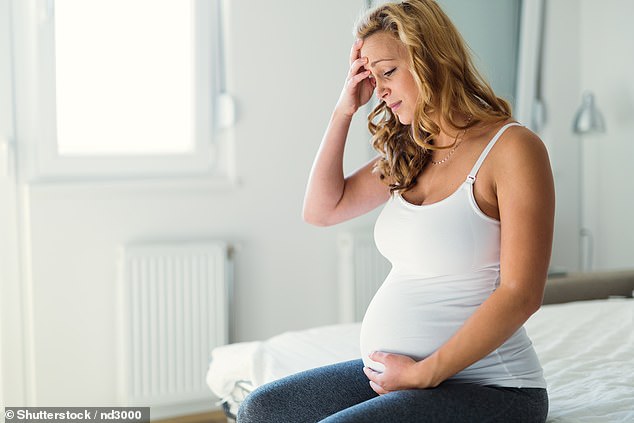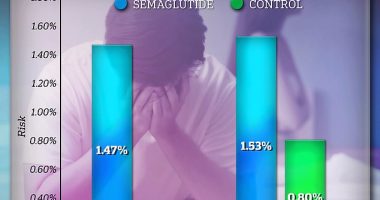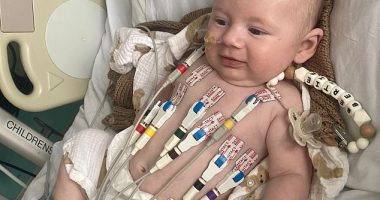Pregnant women who were stressed out during the Covid pandemic gave birth to babies with smaller brains, according to the results of a study that has been immediately slammed as ‘alarmist’ by British experts.
Scientists from the Children’s National Hospital in Washington DC, claimed their research, involving 150 mother and baby pairs, found significant reductions in the brain size of infants born to mothers who scored high stress scores in the pandemic.
This included reductions in the cerebral white matter, an interior part of the brain responsible for processing information, the hippocampal area, which governs learning, and the amygdala, areas which govern emotion.
Authors of the study claimed this ‘stunted growth’ could lead to an increased chance of babies suffering from problems like anxiety later in life.
However, British specialists have poured cold water on the conclusion, saying it was ‘not supported by the data’.


Scientists from the Children’s National Hospital in Washington DC, claimed their study of some 150 mother and baby pairs found significant reductions in the brain size of infants born to mothers who scored high stress scores in the pandemic (stock image)
The study compared maternal stress scores of two cohorts of mothers — 103 pre-pandemic and 56 during the pandemic — with brain scans of their infants.
Mothers in the Covid group had about triple the chance of scoring above thresholds to measure anxiety, stress and psychological distress compared to their pre-pandemic counterparts.
Their babies’ brains were up to 0.3cm smaller in the cerebral white matter and hippocampus areas.
The amygdala, the brains emotional processing centres, were up to 0.5cm smaller in babies of the stressed pandemic mums.
But Professor Grainne McAlonan, an expert in neuroscience at King’s College London, said the findings needed to be treated with caution.
‘In my view this paper uses unjustifiably alarming language and is not especially a paper about Covid,’ she said.
‘Rather it is a paper about possible response of the early brain to maternal stress during pregnancy and stress unsurprisingly was higher during Covid.’
She added that while the paper did find differences in the brains the authors had failed to demonstrate what, if anything, these actually meant.
‘Whether this difference is clinically meaningful was not established, there are no childhood outcomes, so assigning a value to brain volume differences by using words like “stunted” is entirely inappropriate and not supported by the data,’ she said.
‘In general, in brain imaging studies, bigger brain regions are not necessarily better unless there is a clear relationship between brain size and a brain function. The authors do not look at this.
‘All that has been shown here is a possible brain response to maternal stress during pregnancy and a very small effect at that. We cannot tell whether it’s good or bad.’
Professor McAlonan also pointed out that data on pandemic mothers was gathered between 2020 and 2022.
This, she said, was a long period of difference and that mothers who experienced pregnancy during the height of the 2020 lockdowns likely had a very different experience than those carrying babies in 2022.
Another flaw she identified was how mothers’ distress was measured, which was if they scored high on a self-reported threshold.
‘Distress is complex, variable and exists on a continuum and using this kind of cut-off may not be optimal,’ she said.


The above graph shows the likelihood of a particular behavior in pandemic babies compared to non-pandemic babies by their first birthday. Pincer refers to using the thumb and index figure together. Pandemic babies were more likely to crawl, but less likely to be talking, pointing or waving goodbye
She added however, that more work needed to be done to answer if any of the observed differences in brains in infants did amount to any changes in their future development.
None of the women in the smaller pandemic cohort tested positive for the virus during pregnancy.
The authors acknowledged their study is small and being composed of primarily White highly educated women may be less relevant to other populations.
Previous studies have linked stress during pregnancy to alterations in how babies brains develop, potential causing emotional problems later in life.
British researchers previously linked higher levels of the stress hormone cortisol in mothers with structural changes in the amygdala of newly born babies.
Cortisol is involved in the body’s response to stress — with higher levels indicating higher stress — and also plays a role in foetal growth.
The amygdala — of which there are two in each hemisphere of the brain — is known to be involved in emotional and social development in childhood.
Multiple studies have also sought to uncover if and how babies born into the Covid years differ from their peers and many have uncovered mixed results.
Some have found that they have an altered gut microbiome — the ecosystem of ‘good’ and ‘bad’ bacteria in the digestive system — which may be leading them to have fewer food allergies and a stronger immune system.
Others have found negatives such as youngsters who were born in the pandemic being less likely to have said their first words by their first birthday compared to babies born pre-Covid or point at objects.
Experts have theories the above observations may be due to mask wearing during pandemic limited children’s ability to read facial expressions or see people’s mouths move as well as a reduction in socialisation during lockdowns.
Source: Mail Online








